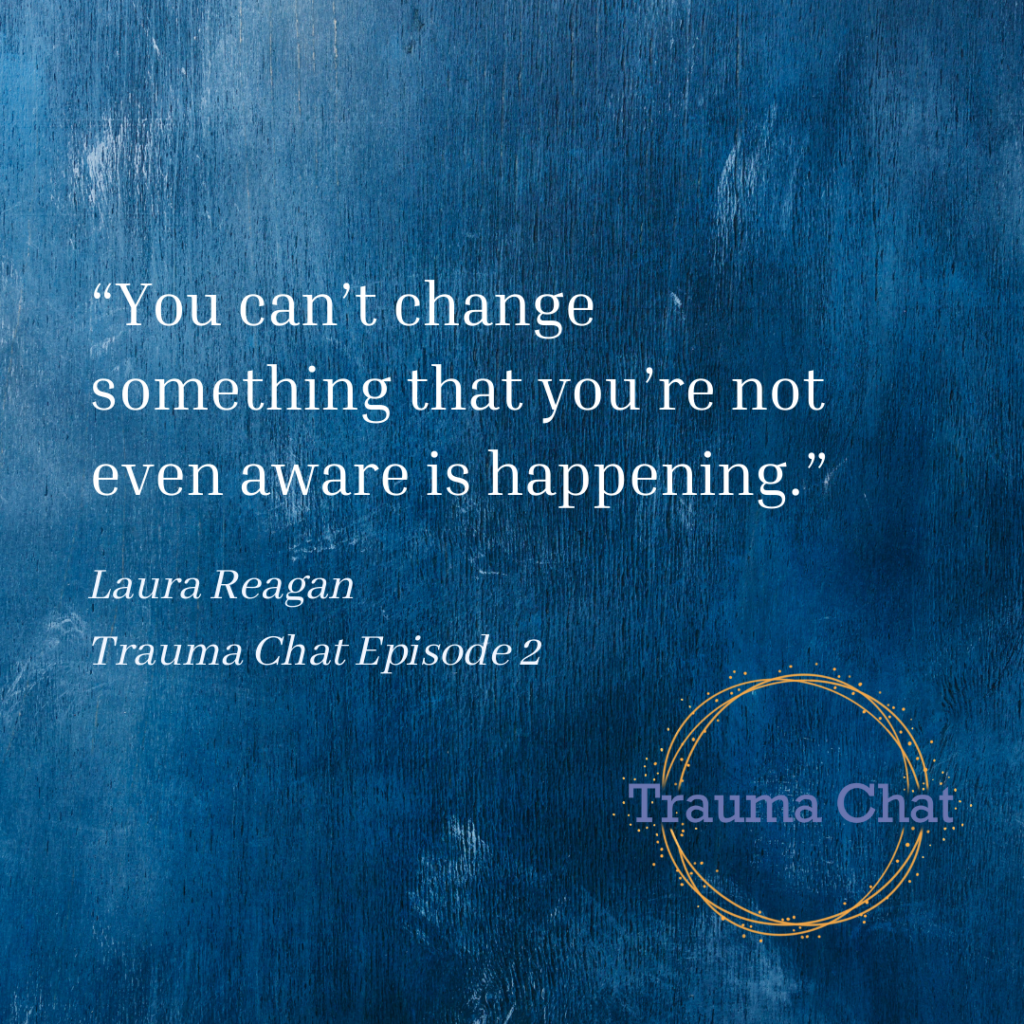
We all realize that experiencing a scary or overwhelming event can affect an individual. Oddly enough, it’s common in Western culture to dismiss the long-term impact of traumatic experiences.
Here’s a summary of Episode 2 of Trauma Chat podcast, which explains what is trauma is in basic terms.
In this week’s episode of Trauma Chat, Laura Reagan, LCSW-C, guides listeners through a discussion on what trauma is. In addition, we explain some events that affect individuals.
Listen to the full second episode of Trauma Chat here, or keep reading for an overview of this week’s episode.
To answer the question “What is Trauma,” we have to understand what happened after.
Generally, we understand trauma as any experience that overwhelms your ability to cope and leaves you feeling powerless.
Keep in mind that what makes an event overwhelming to your nervous system rests on a number of factors.
For example:
- Your age at the time of the event
- Access to a support system
- What happened after the event
- And many addtional factors may affect your ability to cope with a given experience.
This can cause trauma to be scary, violent and overwhelming
In fact, events occurring in childhood tend to lead to symptoms over the lifespan. This is particularly true if a child must deal with their feelings about the experience on their own. In addition, if there were no adults around who were able to help the child make sense of the experience in order to find safety – both emotionally and physically.
How One Person Defines ” What is Trauma,”Differs Based on the Person
What one person translates as a traumatic experience, another may not. These inconsistencies can make it difficult to understand trauma, and whether or not you have experienced it. However, don’t worry, the Therapy Chat Trauma Podcast is here to help you understand trauma in terms. We make this easy to understand and relatable.
It’s Important to Address the Important Effects of Trauma on You
It is always worthwhile to confront the question of whether or not this has impacted your life. This is because “the more awareness we can have about the way that we experience trauma, then the more we can realize how we’re impacted and take action to break those patterns that are related to those past traumatic experiences,” says Laura Reagan, LCSW-C, an integrative trauma therapist and podcaster who practices outside of Baltimore, Maryland.
What are examples of potentially traumatic experiences?

- Physical abuse in childhood: being hit, spanked, being hit with objects
- Emotional abuse: being put down, being called names, controlling, authoritarian parenting style
- Physical neglect: when your physical needs were not taken care of in childhood. (Even if your parents were doing the best they could).
- Emotional neglect: the attachment development needs that all children have were not met at home. (For example, your emotions being dismissed, being told not to cry, growing up in a family where people don’t talk about feelings openly)
- Sexual abuse
- Sexual violence occurring at any age, including sexual harassment in the workplace
- Emotional incest
- Experiencing community violence
- Having surgery or another scary medical procedure in childhood
- Being a member of a group that experiences marginalization or opppression. For example, BIPOC
- Experiencing racism, discrimination, oppression, genocide
- Divorce of parents
- Witnessing your parents physically fighting or yelling at each other
- Being bullied or witnessing someone else being bullied
- Having a traumatic birth
- Living in a place where a terrorist attack has occurred
- Surviving a mass shooting, or knowing that a mass shooting occurred where you live
- Poverty, famine, deprivation
- Incarceration of family members
- Knowing someone who died by suicide
- Having a primary caregiver who abused alcohol or substances
- Losing a parent during childhood
- Adoption and foster care
*Disclaimer: This is not an exhaustive list. There are many experiences that can be traumatic.
if you believe you were affected by a traumatic event, trust your own wisdom.
What resources can help me gain a better understanding of what is trauma?
Hopefully, now you have a better understanding of what is trauma. Plus you can identify experiences seen as traumatic events. Now that you have the basics down, there are so many more resources available out there to better understand what you’re dealing with. The Podcast episodes in this blog are in a list below:
- Listen to the full second episode of Trauma Chat here.
- Episode 19 of Therapy Chat (note this episode is from when Therapy Chat had a different name, The Baltimore Annapolis Psychotherapy Podcast).
- Episode 280 of Therapy Chat with Dr. Karol Darsa
- Dr. Karol Darsa’s book, The Trauma Map: purchase on Amazon
- Episode 246 of Therapy Chat, a replay of a previous interview with Dr. Gretchen Schmelzer on the process of therapy for relational trauma
- Dr. Gretchen Schmelzer’s book, Journey Through Trauma: A Trail Guide to the 5 Phase Cycle of Healing Trauma: purchase on Amazon
- Dr. Gretchen Schmelzer’s website
Trauma is frustrating, but there is hope for the future

You may be experiencing frustration and uncertainty that you will find the right trauma therapist for you. People spend years in therapy seeking support. However, they end up having disappointment. This is because they did not get the support they were needing at the moment. Why is it necessary to find a therapist who understands your history? Understanding traumatic events as a therapist mean better care for individuals with trauma and survivors. It’s time to get the support you need in life. This directory is the place to find that. The goal for our therapists will be able to connect with the people they serve best and find qualified colleagues to refer to as needed.
If you’re ready to find the trauma therapist that is going to help you have a breakthrough then check out our online therapy directory. Know that we are regularly adding therapists to our directory. Therefore, the list will only continue to grow. To get started follow these steps:
- Head to our find a therapist page.
- Begin looking for a therapist in your area and select one that is a good fit.
- Visit their website and learn about our therapists.
- Get in touch and begin finding hope and healing!
*If you’re a therapist who is looking to be a resource for individuals needing help, learn about our directory. Then, visit our page to get set up as a therapist today!
Additional Resources on The Trauma Therapist Network
*Leave a message with a question to be included in a future episode:
https://www.speakpipe.com/traumachatpod
*Follow Trauma Chat on Instagram:
www.instagram.com/traumachatpod
*Follow Trauma Therapy Coaching & Consulting on Facebook:
www.facebook.com/traumatherapyconsulting
*Get more information on Trauma Chat at:
Sign up for the email list to stay in touch!
*Find a Trauma Therapist Near You:
www.traumatherapistnetwork.com – a community for finding information, resources, and help for trauma.
*To listen to Laura’s other podcast, Therapy Chat, go to:
Lastly, if you like Trauma Chat please go to iTunes to leave a rating. Or perhaps, leave a review and subscribe to catch each episode as soon as it comes out.




